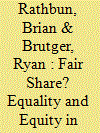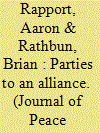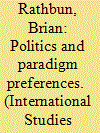|
|
|
Sort Order |
|
|
|
Items / Page
|
|
|
|
|
|
|
| Srl | Item |
| 1 |
ID:
179869


|
|
|
|
|
| Summary/Abstract |
American politicians repeatedly and strenuously invoke concerns about fairness when pitching their trade policies to their constituents, unsurprisingly since fairness is one of the most fundamental and universal moral concepts. Yet studies to date on public opinion about trade have not been designed in such a way that they test whether fairness is important, nor whether the mass public applies fairness standards impartially. Drawing on findings in social psychology and behavioral economics, we develop and find evidence for an “asymmetric fairness” argument. In a national survey of Americans, we find strong evidence that fairness, conceived in terms of equality, is crucial for understanding support for potential trade deals and support for renegotiating existing ones. Americans view as most fair and most preferable outcomes in which concessions and benefits are equal across countries, especially when those equal benefits match productivity. However, we find that Americans have an egoistically biased sense of fairness, responding particularly negatively to any outcome that leaves the United States relatively worse off—a sense of injustice that does not extend to the same degree to relative gains for Americans.
|
|
|
|
|
|
|
|
|
|
|
|
|
|
|
|
| 2 |
ID:
178685


|
|
|
|
|
| Summary/Abstract |
While much research has been done on the domestic determinants of alliance institutionalization, there has been a neglect of the effect of domestic politics, by which we mean contestation between political actors in the same country. We hypothesize that the ideology of the parties governing countries negotiating the terms of security relationships will affect their preferences over the degree and kind of institutionalization seen in alliances. Drawing on previous literature, we argue that rightist parties are more sensitive to sovereignty costs and will therefore insist on maintaining more control over policy than their leftist counterparts. They can assert control either by imposing hierarchical forms of institutionalization when they are a stronger party to an alliance or by avoiding institutionalization altogether if they are the weaker party in an alliance. In contrast, we expect leftist parties to be less sensitive to sovereignty costs and generally favorable to more voice-driven, egalitarian institutions that have institutionalized mechanisms for consensus-building, regardless of their country’s relative power position. Combining the ATOP dataset on alliance design with the Parties Manifesto Project, we find broad support for our hypotheses. Our findings indicate that scholars should pay more attention to the internal ideological contestation within countries, making room for domestic political factors that go beyond regime type.
|
|
|
|
|
|
|
|
|
|
|
|
|
|
|
|
| 3 |
ID:
118164


|
|
|
|
|
| Publication |
2012.
|
| Summary/Abstract |
Are international relations scholars objective observers of political events, or do our political preferences influence the way in which we see the world? This article explores that question using data from a survey of international relations scholars. It develops and tests hypotheses about how we might expect adherents of particular paradigms to identify themselves politically on a left-right scale based on the resonance between the content of ideology and the key propositions of different schools of thought in IR. Although they are relatively centrist, I find that realists are the most conservative and right-leaning of international relations scholars, while Liberals are more liberal and left-leaning. Although neither approach has any intrinsic ontological content, rationalism and constructivism also have a distinct ideological profile, the former being more conservative than the latter. Post-positivist epistemological commitments are associated with the political left. More importantly, there is an interaction between ontology and epistemology. Positivism plays a role in breaking the link between political values and paradigm choice. Nonpositivists demonstrate the strongest connection between ideology and international relations approach. I consider the implications of these findings for the use of paradigms in international relations theorizing, arguing that they should make us more circumspect about the use of paradigms in our discipline.
|
|
|
|
|
|
|
|
|
|
|
|
|
|
|
|
| 4 |
ID:
161210


|
|
|
|
|
| Summary/Abstract |
Realpolitik, the pursuit of vital state interests in a dangerous world that constrains state behavior, is at the heart of realist theory. All realists assume either that states engage in such behavior or, at the very least, are highly incentivized to do so by the structure of the international system. Classical realists remind us, however, that Realpolitik presupposes rational thinking, which should not be taken for granted. Some leaders act more rationally than others because they think more rationally than others. Research in cognitive psychology provides a strong foundation for classical realist claims that Realpolitik requires a commitment to objectivity and deliberation, a particular psychology that few leaders exhibit. A case study of Otto von Bismarck's role in German reunification demonstrates that rationality is the exception, rather than the norm. Even though Prussia was under enormous structural constraints that should have incentivized Realpolitik, the man who would become the Iron Chancellor was isolated because of his foreign policy views. Bismarck consistently disagreed with conservative patrons and allies at home, disagreements that can be reduced largely to his higher degree of rationality.
|
|
|
|
|
|
|
|
|
|
|
|
|
|
|
|
| 5 |
ID:
082840


|
|
|
|
|
| Publication |
2008.
|
| Summary/Abstract |
Neoclassical realism is often criticized by non-realists for being an ad hoc and theoretically degenerative effort to explain away anomalies for neorealism. In this paper, I argue instead that neoclassical realism is a logical extension and necessary part of advancing neorealism. Structural realism argues that the system constrains but does not determine state action and where foreign policy departs from what would be ideal behavior given a state's structural position, domestic politics and ideas are generally the cause. This focus on mistakes and maladaptive behavior, seen in such neoclassical realist concepts as over-or under-balancing, is necessary to avoid falling into the trap of merely using domestic politics and ideas to make neorealism more determinate and explain residual variance in foreign policy choice unaccounted for by structure. The article attempts to correct the mistaken presumption that particular paradigms own domestic politics and ideas, asserting instead that each paradigm has access to these variables but must make them their own
|
|
|
|
|
|
|
|
|
|
|
|
|
|
|
|
| 6 |
ID:
119671


|
|
|
|
|
| Publication |
2013.
|
| Summary/Abstract |
The Tea Party is a powerful new force in American domestic politics, but little is known about its supporters' views on foreign affairs. New survey data indicates that supporters of the Tea Party exhibit attitudes on international relations consistent with the Jacksonian tradition in American political thought but not, as some have maintained, isolationist opinions of the Jeffersonian variety. Jacksonians are supporters of a strong defense and a large military presence abroad and are opposed to Wilsonian global idealism. The article operationalizes support for these three different foreign policy traditions by connecting them to previous findings on the structure of American foreign policy. The effect of Tea Party affiliation on foreign policy attitudes is severely weakened, however, once we control for political ideology, particularly economic conservatism. As is the case in domestic politics, Tea Party sympathizers seem to be somewhat ordinary conservatives, not a completely new breed. There is a direct parallel between their domestic attitudes and their foreign policy attitudes. Their lack of support for idealistic policies abroad, their most prominent set of attitudes, is part and parcel of a lack of social solidarity indicated in their more economically libertarian position at home.
|
|
|
|
|
|
|
|
|
|
|
|
|
|
|
|
| 7 |
ID:
145098


|
|
|
|
|
| Summary/Abstract |
What are the ideological sources of free trade attitudes? Free trade plays a crucial role in classical liberal theory as a way of increasing the prospects of peace between states. Are liberal individuals more supportive of free trade? The literature on foreign policy beliefs largely neglects the question of trade, and those exceptions that find support for the liberal hypothesis generally rely on faulty conceptualization. Using surveys of the American mass public and American elites, this article finds that the combination of views that marks classical liberalism does not in fact predict support for free trade at either the mass or the elite level. Support for free trade at the mass level has libertarian, not liberal, foundations, predicted by a combination of social and economic libertarianism. At the mass level, the combination of cosmopolitanism and dovishness that constitutes foreign policy liberalism has no effect on trade attitudes. At the elite level, cosmopolitanism is actually generally negatively associated with support for free trade. Free trade is a wedge issue that creates strange alliances at the elite level between cosmopolitans and isolationists generally hostile to one another on foreign policy and at the mass level between social and economic libertarians typically antagonistic to each other's domestic agenda.
|
|
|
|
|
|
|
|
|
|
|
|
|
|
|
|
|
|
|
|
|